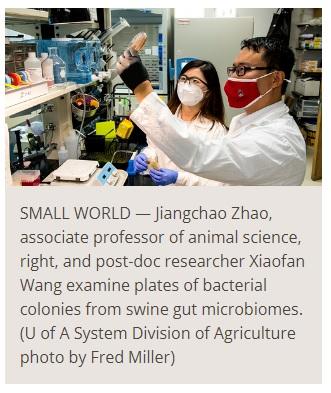Animal scientists pioneer new methods for culturing swine gut microbiomes
Published: October 1, 2021
Source : https://www.uaex.uada.edu/media-resources/news/2021/september2021/09-30-2021-Ark-Swine-gut-microbiome.aspx
By Fred Miller / University of Arkansas System Division of Agriculture
FAYETTEVILLE, Ark. — Arkansas Agricultural Experiment Station scientists have developed bacterial cultivation methods to isolate different bacteria from pigs. These methods could be used to culture beneficial bacteria in swine intestinal, or gut, microbiomes that can serve as probiotics to protect or improve the health of pigs.
 Guided by these methods, the researchers isolated three bacterial strains that were positively correlated with swine growth performance, said Jiangchao Zhao, associate professor of animal science for the Agricultural Experiment Station, the research arm of the University of Arkansas System Division of Agriculture. These strains were developed into probiotics.
Guided by these methods, the researchers isolated three bacterial strains that were positively correlated with swine growth performance, said Jiangchao Zhao, associate professor of animal science for the Agricultural Experiment Station, the research arm of the University of Arkansas System Division of Agriculture. These strains were developed into probiotics.“Probiotics improve swine health and performance, benefit the animals and agriculture, and help feed the world,” Zhao said.
The bacterial cultivation methods were published in a scientific paper, “Comprehensive Cultivation of the Swine Gut Microbiome Reveals High Bacterial diversity and Guides Bacterial Isolation in Pigs,” was published in July on mSystems, a journal of the American Society for Microbiology.
The paper can be read or downloaded from the Web: https://bit.ly/aaes-SwineGut
Probiotics can reduce reliance on antibiotics to protect animal health, Zhao said. “The remarkable progress in swine gut microbiome and big data analysis have revealed many potential probiotics that are positively correlated with growth performance,” he said. “However, we can’t call them probiotics until we are able to culture them and prove their beneficial effects.
“We’ve developed a roadmap to culture a huge variety of bacteria, including these potential probiotics, from pigs,” Zhao said. “This is the first step to develop novel, next generation probiotics that improve health and growth performance of pigs.”
Kent Nutrition Group, Inc., a member of the Kent Corporation family of businesses, will take the probiotics to market under an exclusive licensing agreement.
“This discovery by the university and Dr. Zhao’s team is an innovative breakthrough in animal nutrition,” said Mike Gauss, president of Kent Nutrition Group, headquartered in Muscatine, Iowa. “Today more than ever pork producers around the world need alternative nutrition solutions to improve efficiencies, profitability and sustainability. Kent Nutrition Group is extremely proud and eager to now roll up our sleeves and make this swine probiotic advancement commercially available worldwide.”
Arkansas ranks 24th in the nation in hog and pig production, which contributed nearly $52 million to the state’s agricultural economy in 2019, according to “Arkansas Agricultural Profile,” the 2020 Pocket Facts published by the Division of Agriculture. It can be found online: https://bit.ly/AAES-2020PocketFacts
Getting here
Developing a useful probiotic for swine begins by identifying bacteria populations living in a pig’s intestinal tract, called the gut microbiome, Zhao said. Swine gut microbiome studies have been the focus of many research projects because pigs serve as excellent biomedical models for human diseases, and because they are an important source of dietary protein. But a thorough and inclusive survey of the microbial environment in the swine gut had not been done.
Xiaofan Wang, a post-doctoral research associate in Zhao’s lab, began a comprehensive investigation of the swine gut microbiome aimed at improving swine health. Zhao’s research team collected fecal samples from pigs at the experiment station’s Swine Research and Teaching Center and subjected them to next generation DNA sequencing. Also known as high-throughput sequencing, this is a scientific method that allows researchers to sequence DNA for massive numbers of organism samples quickly.
Their investigation resulted in a highly detailed description of the bacterial environment of swine guts, and they discovered that there are many more bacteria in there than previously known. “We identified previously undetected bacteria,” Zhao said.
You can read the complete report here.
Source
https://www.uaex.uada.edu/media-resources/news/2021/september2021/09-30-2021-Ark-Swine-gut-microbiome.aspxRelated topics:
Recommend
Comment
Share

Would you like to discuss another topic? Create a new post to engage with experts in the community.





.jpg&w=3840&q=75)